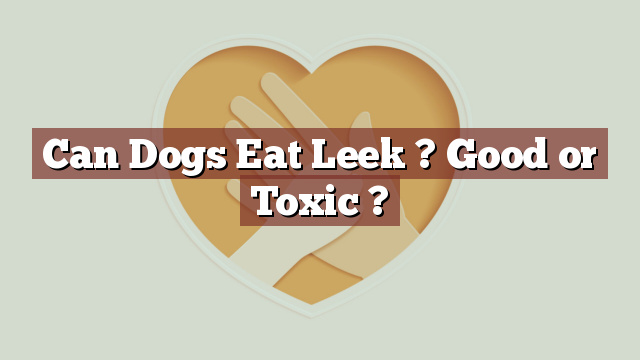Can Dogs Eat Leek ? Good or Toxic ?
Ensuring the well-being and safety of our beloved pets is of utmost importance to any responsible dog owner. One key aspect of this is being aware of what foods are safe for our canine companions to consume. In this article, we will explore the question: can dogs eat leek? We will delve into the nutritional value of leek, discuss its safety and toxicity considerations, examine the potential risks and benefits of dogs consuming leek, provide steps and precautions to take if your dog has eaten leek, and ultimately conclude on the importance of moderation and guidance when it comes to leek consumption.
Nutritional Value of Leek: Vitamins, Minerals, and More
Leek, a member of the Allium vegetable family, is a nutritious vegetable that boasts an array of vitamins, minerals, and other beneficial components. It is rich in vitamins A, C, and K, as well as minerals such as folate, manganese, and iron. Leek also contains dietary fiber, which aids in digestion, and antioxidants that help protect against cell damage. Additionally, it is low in calories, making it an attractive option for those looking to incorporate healthy vegetables into their diet.
Can Dogs Eat Leek? Safety and Toxicity Considerations
Can dogs eat leek? The answer is no, dogs should not consume leek. Leek, along with other members of the Allium family such as onions and garlic, contains a compound called thiosulphate. This compound, while not harmful to humans, can be toxic to dogs. Ingesting leek can lead to a condition called hemolytic anemia, which can cause damage to red blood cells and result in symptoms such as weakness, vomiting, diarrhea, and in severe cases, even lead to death. It is crucial to keep leek, as well as other Allium vegetables, out of reach of our furry friends to ensure their safety.
Potential Risks and Benefits of Dogs Consuming Leek
While leek is not safe for dogs to consume, it is important to note that not all vegetables are harmful to them. Many vegetables, such as carrots and green beans, can actually provide numerous health benefits to dogs when prepared and served properly. These vegetables can offer a source of essential nutrients, promote digestion, and even aid in weight management. However, it’s essential to consult with a veterinarian before introducing any new foods into your dog’s diet to ensure they are safe and appropriate for your specific pet.
My Dog Ate Leek, What Should I Do? Steps and Precautions
If your dog has accidentally consumed leek, it is important to take immediate action. Contact your veterinarian or an animal poison control hotline for guidance. Depending on the amount consumed and your dog’s size, the vet may advise inducing vomiting or monitoring your dog for any symptoms of toxicity. It is always better to be safe and seek professional advice, as they will be able to provide specialized care based on your dog’s individual circumstances.
Conclusion: Moderation and Guidance Key for Leek Consumption
In conclusion, leek is not safe for dogs to eat due to its potential toxicity. While it may be tempting to share our favorite foods with our furry friends, it is essential to prioritize their health and well-being. Instead, opt for dog-friendly vegetables that offer nutritional benefits without posing any risks. Remember to consult with a veterinarian before introducing any new foods into your dog’s diet, as they can provide valuable guidance tailored to your pet’s specific needs. With moderation and proper guidance, we can ensure our dogs stay happy and healthy for years to come.
Thank you for investing your time in exploring [page_title] on Can-Eat.org. Our goal is to provide readers like you with thorough and reliable information about various dietary topics. Each article, including [page_title], stems from diligent research and a passion for understanding the nuances of our food choices. We believe that knowledge is a vital step towards making informed and healthy decisions. However, while "[page_title]" sheds light on its specific topic, it's crucial to remember that everyone's body reacts differently to foods and dietary changes. What might be beneficial for one person could have different effects on another. Before you consider integrating suggestions or insights from "[page_title]" into your diet, it's always wise to consult with a nutritionist or healthcare professional. Their specialized knowledge ensures that you're making choices best suited to your individual health needs. As you navigate [page_title], be mindful of potential allergies, intolerances, or unique dietary requirements you may have. No singular article can capture the vast diversity of human health, and individualized guidance is invaluable. The content provided in [page_title] serves as a general guide. It is not, by any means, a substitute for personalized medical or nutritional advice. Your health should always be the top priority, and professional guidance is the best path forward. In your journey towards a balanced and nutritious lifestyle, we hope that [page_title] serves as a helpful stepping stone. Remember, informed decisions lead to healthier outcomes. Thank you for trusting Can-Eat.org. Continue exploring, learning, and prioritizing your health. Cheers to a well-informed and healthier future!

